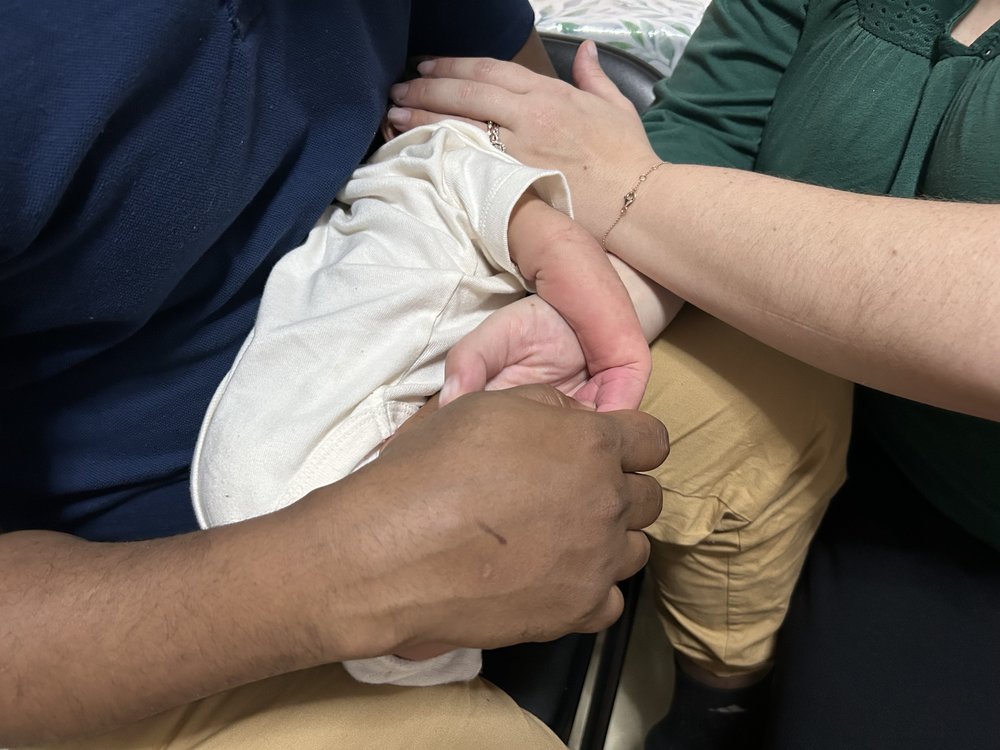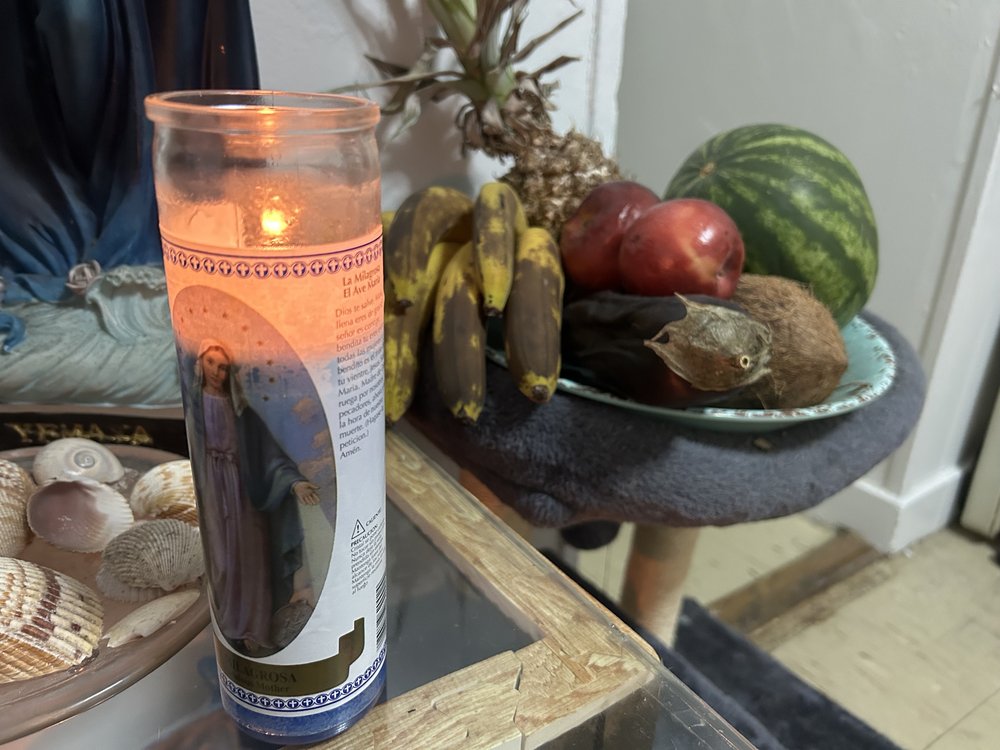'They’re coming for everyone': Fearful NY immigrant families weigh voluntary departures
May 5, 2025, 6 a.m.
Some undocumented immigrants are opting to leave the United States on their own, rather than risk deportation.

Jose and Yaya recently settled into the latest of what they call their “safe houses,” a Bronx apartment furnished with candles and other religious items. The couple says they have been on the move in recent months, prompted by daily headlines about immigration enforcement, and fears that Jose, an asylum applicant from Venezuela, could be put into detention by federal immigration officers without warning – or worse, removed to another country entirely.
“They’re coming for everyone,” said Yaya, 44, who is a U.S. citizen. She gave birth to their son in April and said their recent stays at the homes of various friends and family members come ahead of what they see as an inevitable turn: voluntarily leaving the United States. “So it means (as a family) making real decisions about what keeps your family safe.”
The couple, who asked that their full names not be used because of Jose’s immigration status, are among those in the New York region actively pursuing voluntary departure from the country, or as the Trump administration calls it, “self-deportation.” The administration has aggressively marketed the option in recent weeks – even suggesting that doing so is as easy as tapping a button on a government app. But interviews with attorneys, immigrants rights advocates and immigrants themselves indicate that such departures are no easy chore.
The hurdles include the substantial cost of moving abroad, the uncertainty of being able to legally work and safety. For Jose and Yaya, for example, any retreat to Venezuela is an option they have ruled out, due to ongoing political turmoil and violence in that country.
Nonetheless, immigrants without permanent legal immigration status are in fact leaving – or looking to, according to immigration lawyers, immigrants and their advocates, as well as the federal government. The Trump administration has urged the departures, sending notices to hundreds of thousands of immigrants stating their prior authorization to remain in the United States had been revoked, and advising them, “It is time for you to leave the United States.”
Shivana Jorawar, the co-executive director of Jahajee, a Queens-based organization that serves the Indo-Caribbean population, said three members of the community had “self-deported” in the last month – two had gone to Guyana and another to India – while “lots of people are weighing their options.” Others connected to immigrant communities in New York City say the same.
Undocumented immigrants and green cardholders “ are really terrified about what this political moment could mean for them, their safety, potentially being separated from family members and not seeing their children grow up,” Jorawar said.
Just how many have opted for voluntary departure since President Donald Trump returned to the White House is unclear. The administration has urged immigrants to “self-deport” using the Customs and Border Protection Home app. In a statement to Gothamist, the Department of Homeland Security said “thousands” nationwide have complied but provided no further detail.

On the CBP website, the agency instructs those using the app to select “Departing Traveler,” then “Submit Intent to Depart,” after which users are told to take a picture of themselves using the app and to add biographical details. The agency claims self-deportation is “safe” and convenient and advises those who do so can “keep money earned in the U.S.” and preserve the opportunity for “legal immigration” at a future date.
Some attorneys caution against using the CBP Home app. Camille Mackler, the executive director of Immigrant-ARC, cited “concerns that DHS is hiding the risks of using it in their outreach and advertising for it.”
“People don’t realize they might be barred from returning to the U.S.,” Mackler said.
The Trump administration’s push for voluntary departures comes as the number of deportations has lagged behind the government’s stated goals. The administration vowed to deport 1 million people a year, but in the first 100 days of the Trump administration, Immigration and Customs Enforcement deported 66,000 people, according to an April 29 statement from ICE.
From Venezuela to New York
In Venezuela, Jose worked as a risk assessment analyst for the government, but said he fled that nation in late 2023 after receiving multiple death threats. He journeyed by land to the United States, and now works as a bicycle delivery worker. At times, the loss of his former career weighs heavily on him.
“But I have to have humility about it, right?” he said. “I have a family, I have responsibilities. So I get up every day thinking to myself, ‘Well, this is what I need to do, so I do it.’”

He and Yaya say much remains unclear about the path ahead, including which of four short-listed countries – Mexico, Colombia, Spain and Canada – they’ll ultimately journey to. Factors they are considering include language, ease of securing work and obtaining needed permission. Jose said he is anguished by the thought of relocating his family abroad.
“ I feel this pain because I know that my wife, she's from here, and she has not done this before. She does not know what the suffering is of leaving your home country,” Jose said. “And when I say this, I want to cry because for me, it was very, very hard to leave. It's not an easy decision to leave your country, a place that you love.”
Yaya didn’t argue her husband’s point. In addition to the logistical challenges of moving abroad, she has an older son from a previous marriage and has given him the option of joining them abroad or remaining in the United States to pursue higher studies here.
“ I don't want to turn upside down my oldest son's life,” she said.
But she said the current scenario felt increasingly unsustainable.
“ I'm thinking about my husband's safety,” Yaya said.
“I'm thinking about what happens if I go to work and my husband gets grabbed and he's with the baby. And then what happens to the baby?” she asked. “This is nightmare fuel.”
The potential move abroad has also prompted discussions about what they’ll take with them. The cat, a rescue they adopted during the pandemic, will go, while the goldfish would likely stay behind.

Despite the uncertainty, Jose, who held his sleeping baby while seated in his living room with his wife, said he’s embracing the joy of being a father to a newborn while simultaneously bracing for arrest.
“This moment can feel amazing,” Jose said. “I have my son in my arms. I have a roof, I have food to eat. I'm here with my family. But as soon as we finish this interview, I need to get on that bike. I need to go outside and work, and I don't know what's going to happen. I don't know if I come back.”
But some advise not to ‘self deport’
Bryan Pu-Folkes, an attorney who runs an immigration law practice in Jackson Heights, Queens, said he advised some clients who were on a “path to legal status” to defer the process to a later date, so as to avoid drawing attention to their case.
“People know this administration is not going to last forever, so if you have several years it might make sense to wait,” said Pu-Folkes.
Seth Kaper-Dale, the co-pastor at the Reformed Church of Highland Park in New Jersey, which serves a large immigrant population, said he strongly discourages immigrants from complying with the Trump administration’s self-deportation campaign.
“Our church has been involved in helping immigrants for decades now, and we've had many times under different presidents where people have said things like, ‘If you self-deport, it'll be easier to come back.’ It never is,” Kaper-Dale said.
He likened current efforts to register immigrants to the post-9/11 development of the National Security Entry-Exit Registration System, which was used to register noncitizens from a number of countries, almost all of them predominantly-Muslim.
The National Immigration Law Center said 13,000 people were placed into deportation proceedings through the program. It ended under President Barack Obama, after civil libertarians said it constituted a form of racial profiling.
“ Tons of people, myself included back in that day, thought honesty is the best policy,” said Kaper-Dale. “And we ended up leading sheep to the slaughter and we just made it easier for a regime that was going to use xenophobia and anti-Islam sentiment to be able to go after who they wanted to go after.”
“ Registering for a government that is abusive is not the right thing to do,” he said.
Nuala O’Doherty-Naranjo, the founder of the Jackson Heights Immigrant Center, said she wasn’t aware of entire families who’d left the country due to the political climate.
O’Doherty-Naranjo said that for most immigrants, particularly those from the Latin American countries she most often deals with, the notion of returning to the political turmoil of their homelands is daunting.
“A lot of people have nothing to go back to. They've sold their house, they've abandoned family members to come here,” she said. “If you're fleeing persecution where people are trying to kill you and you've given up everything to get here to be safe, how do you go back to the danger?
Luba Cortés, the civil rights and immigration lead organizer at the advocacy group Make the Road New York, said despite the ongoing “fear and confusion,” the organization didn’t have any members who had self-deported.
“We're not hearing those conversations because people have such deep roots in the country,” she said. “ They've come to the country, they've built lives. They have children that are graduating college. They might be grandparents at this point.”
Pertinderjit Hora, an immigration lawyer based in Richmond Hill, Queens, said she had seven clients who had pursued voluntary departure since the Trump administration came into office.
All were men aged 60 or above from India, Pakistan and Guyana who had spent years trying to secure legal status in the United States and were now “deciding to call it quits.”
“They don't have this fight left in them anymore,” Hora said.
Hora said she’s had a number of conversations with immigrants who are U.S. citizens but are looking for a second citizenship abroad, out of concern of the political climate here. Some, she said, seek to buy property abroad, in countries like Costa Rica, Mexico and Thailand – “a second safe space,” as she called it.
“It’s serious,” Hora said. “They're looking into homes, they're looking into what skills they have, what would carry over. They're taking trips to figure [it] out.”
‘My wife can’t stand living like this’
Others have reached their limit.
Andres Villazana, a 25-year-old from Venezuela, left New York with his wife and 3-year-old child in March out of fear of immigration arrests. The family now resides in Philadelphia, where Villazana said he’s trying to secure construction work.
He hopes to raise enough to return to his native country, beginning with the $700 in bus fares to the southern border. He has been asking acquaintances for financial assistance, to help facilitate his family's move.
Villazana said he lives with the perpetual stress of “getting caught and leaving my wife and baby here alone in this hard country.”
“My wife can't stand living like this,” he said.
Villazana said he came to the United States with the dream of owning a house but things didn’t work out as planned. There were weeks, he said, when he wasn’t paid for work he’d performed. Early on, his wife breastfed their daughter, but now he agonizes over the prospect of not being able to feed the girl. And his parents back in Venezuela died in his absence.
“I have had a very difficult time in this country,” Villazana said.
Villazana said he and his family, none of whom have legal status, are determined to leave the country by June 20.
New York has more than 600K ‘undocumented’ immigrants, data shows. Who are they? New Yorkers driven by deportation fears are flooding immigration lawyers with questions 4-year-old migrant girl, other kids go to court in NYC with no lawyer: 'The cruelty is apparent'